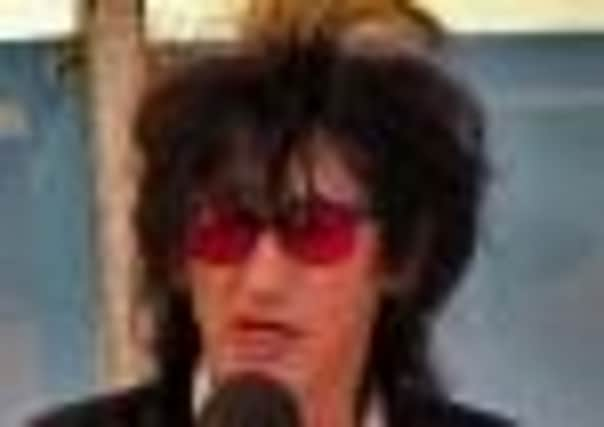Performance poet is still in fine voice


John Cooper Clarke is speaking in as conspiratorial a voice as his strident Salford tones ever get. “Everybody’s got one in the wardrobe, Ian. I bet you’ve got one. And the thing is, nobody looks good in them except Elvis. He looked good. But don’t take Elvis as your guide,” he tells me.
John’s talking about Hawaiian shirts or, to give them their proper name, Tiki shirts. And he’s right, I’ve kept a couple of old ones in the haunted wing of my wardrobe, glowing in the dark by the comedy dressing gown.
Advertisement
Hide AdAdvertisement
Hide AdListening to John riffing on Hawaiian shirts is almost like listening to him declaiming a poem about Hawaiian shirts; for me, the genius of John Cooper Clarke is that he has over a long career reclaimed poetry for the speaking voice, brought it back to the oral form it always was, and given heart to people who didn’t speak ‘proper English’, but who still have things to say. I can just hear that ‘Don’t take Elvis as your guide’ line as a refrain in an epic about Tikis, can’t you?
John’s performing at the Harrogate Theatre on July 3rd and I’d urge you to go and see him. At a time when the phrase ‘National Treasure’ has lost a lot of its currency, he really is one. This hasn’t always been the case: the first time I saw John he was supporting the Be Bop De Luxe at Sheffield City Hall in 1978. Punk was well into its stride by then but as far as the Be Bop De Luxe audience were concerned, it would never happen, not if they had anything to do about it.
John’s poems, delivered at machine-gun speed and accuracy, were met with astonished silence which quickly slid into hostility. I can’t remember much more about that night but I knew I’d found a new hero. People older than me recall John performing Jack Kerouac and Allen Ginsberg-inspired pieces around Manchester’s folk clubs in the early 1970’s but once punk arrived it really was his moment. Because a lot of punk’s history is defined by noise and anarchy, it’s easy to forget that poetry and spoken word formed a large part of its appeal. Poets like Attilla the Stockbroker from Harlow, and Yorkshire’s own Seething Wells, Little Brother and Joolz Denby would hold audiences between bands with slickly crafted, socially pointed and wonderfully delivered verse.
John Cooper Clarke was, for a while, the king of that scene. Poems like Beasley Street from his 1980 album Snap Crackle And Bop define an era that’s fading from literary memory: ‘in the cheap seats where murder breeds somebody is out of breath, sleep is a luxury they don’t need, a sneak preview of death’ and a poem like Positively Chickentown is marinated in the sensibilities of early anti-Thatcher culture in a way that’s too harsh for a family newspaper so this version will have to suffice: ‘the flipping train is flipping late, you flipping wait and flipping wait, you’re flipping lost and flipping found, stuck in flipping Chickentown.’
Advertisement
Hide AdAdvertisement
Hide AdCooper Clarke’s critics have said that his art is a static one that he’s never developed, but I disagree: his 1982 album Zip Style Method contains some marvellous work like Drive, She Said: ‘She wore leatherette jeans, Airwear shoes, I’ve never seen such a rare hair do, a natty dread with a borstal crop. Drive, she said, I’ll tell you when to stop.’
When John came on my Radio 3 show The Verb a couple of years ago he performed a fantastic poem called Things Are Gonna Get Worse, about the process of ageing: ‘Zip up slippers and a spandex waistband, all washed up on planet wasteland, zipped up like a nylon spaceman, things are gonna get worse…’
He read from an exercise book full of crossings-out and rewrites, the creative flame is still alive.There have been the empty years, of course; much of the late 1980’s were lost to drugs and he was brought back into the public eye by, of all things, a TV advert for Sugar Puffs.
I remember my kids being amazed by this spiky-haired stick of a man, standing next to the Honey Monster, and being even more amazed when I told them that he was one of the great stand-up poets of the late 20th Century. And now he’s on the GCSE syllabus, which is a fantastic achievement.
Advertisement
Hide AdAdvertisement
Hide AdJohn’s looking forward to coming to Harrogate and he’s eagerly anticipating a visit to Betty’s. I explain the concept of a Fat Rascal to him and when he says ‘fat rascal’ back to me, enunciating each syllable perfectly, I’m once more in a John Cooper Clarke poem. Let’s bring him blinking into the light of public and critical acclaim like one of my old Hawaiian shirts. He is a legend, a treasure, an icon. A Thin Rascal, with style.